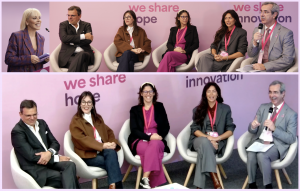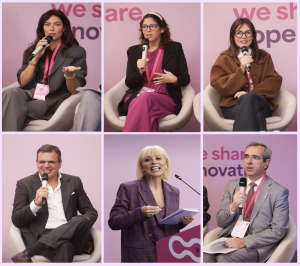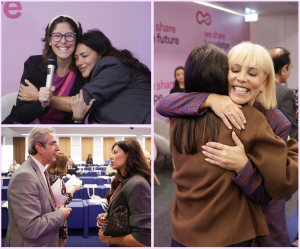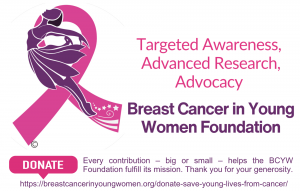
Voices of Hope for BCYW: Insights into Emotional Health & Research Innovations Inspired by Brave Young Women Testimonies
Personal Testimonies of Young Women Breast Cancer Survivors Shaping Emotional Health and New Research Directions for BCYW Foundation
DENVER, CO, UNITED STATES, December 4, 2024 /EINPresswire.com/ -- The recent International Conference on Young Women’s Breast Cancer and Health in Lisbon brought together experts, survivors, and advocates to discuss the critical issues affecting young women diagnosed with breast cancer. In addition to cutting-edge research worldwide, the conference also focused on the need for solutions, emotional support, community engagement, and improved studies tailored to the unique experiences of younger patients.This press release is part of the Breast Cancer in Young Women Foundation’s (BCYW Foundation) session-specific highlights series, which started on December 2nd, 2024. The BCYW Foundation hopes that these critical discussions and insights will likely shape future efforts in the fight against breast cancer in young women.
LISTENING TO PATIENT'S VOICES: THE POWER OF TESTIMONIES
The 2nd day began with an emotional session titled The Patient Voice, moderated by Prof. Luís Costa, in which breast cancer survivors, family members, and healthcare professionals shared their personal experiences. The session underscored the importance of understanding and addressing the emotional and psychological impact of breast cancer, especially for younger women.
Actress Sofia Ribeiro, who was diagnosed with breast cancer nine years ago, reflected on the progress made in raising awareness and promoting early detection “but also emphasized that there is still much to be done,” she said, emphasizing the importance of early detection and self-awareness. “We’ve made significant strides in demystifying breast cancer, but we need to continue breaking down taboos and providing more information to empower women,” she said.
“Testimonies like mine encourage people to pay closer attention to their bodies and signals,” Sofia noted. She highlighted the often-overlooked emotional toll of breast cancer, urging greater focus on psychological well-being. Sofia underscored the importance of emotional health in the fight against breast cancer. “It’s not just about physical treatment. “In addition to physical health, we need to care for our emotions.
Many women I’ve spoken to have linked their diagnoses to significant emotional stressors, such as the loss of a loved one, relationship breakdowns, or career changes. These experiences can affect our physical health, making it crucial to take care of our emotions;” “We need to take emotional health seriously as it intertwines deeply with this disease,” she explained.
She also stressed the importance of trust in medical care. “Trust in your healthcare team is vital. At such a delicate, delicate, and challenging time, patients need to feel confident in their care and the decisions being made on their behalf; reassurance and open communication can transform a patient’s journey,” she stressed.
A HOLISTIC APPROACH TO PATIENT CARE
Marta, another breast cancer survivor, echoed Sofia’s message, emphasizing the need for a more holistic approach to treatment and post-treatment for survivors. “When we talk about breast cancer, we need to remember that these women are not just a diagnosis—they are individuals with emotions, fears, and concerns. Their experience of the disease is shaped by far more than just the physical treatment,” she said. Marta, who has been vocal about her experience, advocated for better support systems for young women before and after diagnosis. “We need a system that supports us emotionally, especially after the treatment ends. Returning to work, rebuilding our lives, families, and relationships, careers, and regaining self-image takes time and requires as much attention as the treatment itself,” she added.
Marta also proposed research into the emotional factors that may influence the onset of breast cancer. “Many women associate their diagnosis with a traumatic event, but there is little scientific research on this connection. We need to explore whether emotional trauma could potentially contribute to a heightened risk of cancer,” she suggested. Marta also noted that young women often experience different side effects from breast cancer treatments compared to older women, yet these differences are usually underreported. “There’s a need for research that specifically addresses the unique experiences of young women with breast cancer,” she concluded.
A LEGACY OF ADVOCACY AND RITA's DETERMINATION
Duarte, a journalist, and husband of Rita, a young woman who tragically passed away from breast cancer, shared the emotional story behind the creation of the BCYW Foundation. “Rita often asked, ‘Why me?’ and that question is at the heart of why we need more research into the disease. It inspired us to create the foundation to give young women like her a voice;” her determination and positivity drove her fight,” he recalled.
He highlighted the importance of timely diagnosis and second opinions, recalling his wife’s experience of receiving a delayed diagnosis. “Rita’s metastatic disease wasn’t identified until six months after her initial diagnosis —time that could have made a significant difference, which had serious implications for her treatment,” he explained.
“This experience showed us how important it is to advocate for second opinions and not be afraid to seek better answers,” he said. Duarte also noted the significant challenges faced by families dealing with breast cancer, including the financial strain of delayed treatments and long wait times in public health systems. “These anxieties rob patients and their families of quality of life when they should feel supported and assured;” “These issues create a sense of uncertainty for patients and their families, which only adds to the emotional burden of the disease,” he said.
Despite these challenges, Duarte emphasized the “importance of maintaining hope and instilling a sense of peace in their children,” “even in the face of loss, we’ve gained profound lessons about resilience and humanity,” he said. “The hardest part of breast cancer is watching your loved one suffer. But we found solace in teaching our children that despite the sadness, there are lessons to be learned from this experience, and resilience is one of them,” he shared.
NEW STRATEGY FOR ADVOCACY AND SUPPORTING YOUNG WOMEN
Marta Pojo, representing the Portuguese League Against Cancer, discussed the League’s role in empowering women with breast cancer, particularly younger women. She highlighted the need for a greater understanding of the risk factors associated with breast cancer, particularly those that are not yet well-studied, such as emotional and lifestyle factors.
“Younger women often have a better understanding of health and disease, which can help them feel more in control during their treatment journey. However, this also means that their unique needs must be met with targeted information and care,” Marta explained. She also advocated for establishing focus groups where young survivors could share their experiences, which could inform future research and improvements in patient care.
“There are many side effects of treatment that are specific to younger women, but they are often overlooked in existing literature. This highlights the need for research focused on YWBC, to understand better the challenges they face and ensure their voices are heard,” Marta said. The League has also developed initiatives to support the mental health of patients, including psychological consultations for children of cancer patients. “We must address the mental and emotional well-being of both patients and their families,” Marta concluded.
The GIFT OF TIME AND GRATITUDE
Marta Flores, a breast cancer survivor, shared a deeply personal, passionate story of how the disease changed her perspective on life. “Cancer stole time from me, but thanks to my doctors and the advancements in medicine, I’ve gained it back,” she said emotionally.
Now cancer-free, Marta explained that her greatest goal is to become a mother, something she never imagined before her diagnosis. Now cancer-free, she described her greatest project: becoming a mother. “I never wanted to be a mother before, but now it’s all I desire—a way to honor the life that was returned to me,” she shared.
Marta expressed her gratitude to healthcare professionals and researchers for giving her a second chance at life. Marta reflected on the role of healthcare professionals in her journey, praising the “incredible relationship” she had with her surgeon. “I didn’t want a lot of information about my disease or treatment.
Each person is unique, and I prefer to deal with challenges as they arise. Marta also emphasized the importance of respecting each patient’s individual journey. “Not everyone wants to know all the details about their disease, and that’s okay. Each person’s approach must be honored,” she said, highlighting the invaluable relationship she built with her medical team. But the bond I had with my medical team was invaluable. They gave me time, hope, and strength,” she said.
TOWARDS PERSONALIZED BCYW MEDICINE
Closing the session, Prof. Luís Costa emphasized the need for a more personalized approach to breast cancer treatment. “Personalized medicine is not just about cells, genomics, or proteomics—it’s about understanding the person behind the disease. Every patient is unique, and it’s critical to consider that when providing care. Communication, trust, and individualized follow-up are all key elements that should define personalized care,” he stated.
The session concluded with a renewed focus on filling the current gaps, urging greater targeted research into the emotional and psychological aspects of breast cancer, the need for more focused studies on young women’s experiences, and the importance of providing holistic, individualized care. It was a powerful reminder of the value of human stories behind the disease and the clinical challenges; the voices of those affected by breast cancer should lead the collective responsibility to address their needs with compassion and innovation for a better outcome for future generations.
ABOUT THE BCYW FOUNDATION
The Breast Cancer in Young Women Foundation (BCYW Foundation) is a global organization dedicated to advancing research, raising awareness, and providing support to young women affected by breast cancer. Through partnerships and advocacy, the foundation is committed to creating a future where no young woman feels overlooked in her fight against this disease.
Make A Donation: Every contribution – big or small – helps the BCYW Foundation fulfil its mission to save the lives of young women from breast cancer in the years to come. Thank you for your generosity.
Rakesh Kumar, Ph.D., Founder and CEO
Breast Cancer in Young Women Foundation
bcywf@breastcancerinyoungwomen.org
Visit us on social media:
Facebook
X
LinkedIn
Instagram
YouTube
Distribution channels: Culture, Society & Lifestyle, Education, Healthcare & Pharmaceuticals Industry, International Organizations, Social Media
Legal Disclaimer:
EIN Presswire provides this news content "as is" without warranty of any kind. We do not accept any responsibility or liability for the accuracy, content, images, videos, licenses, completeness, legality, or reliability of the information contained in this article. If you have any complaints or copyright issues related to this article, kindly contact the author above.
Submit your press release



